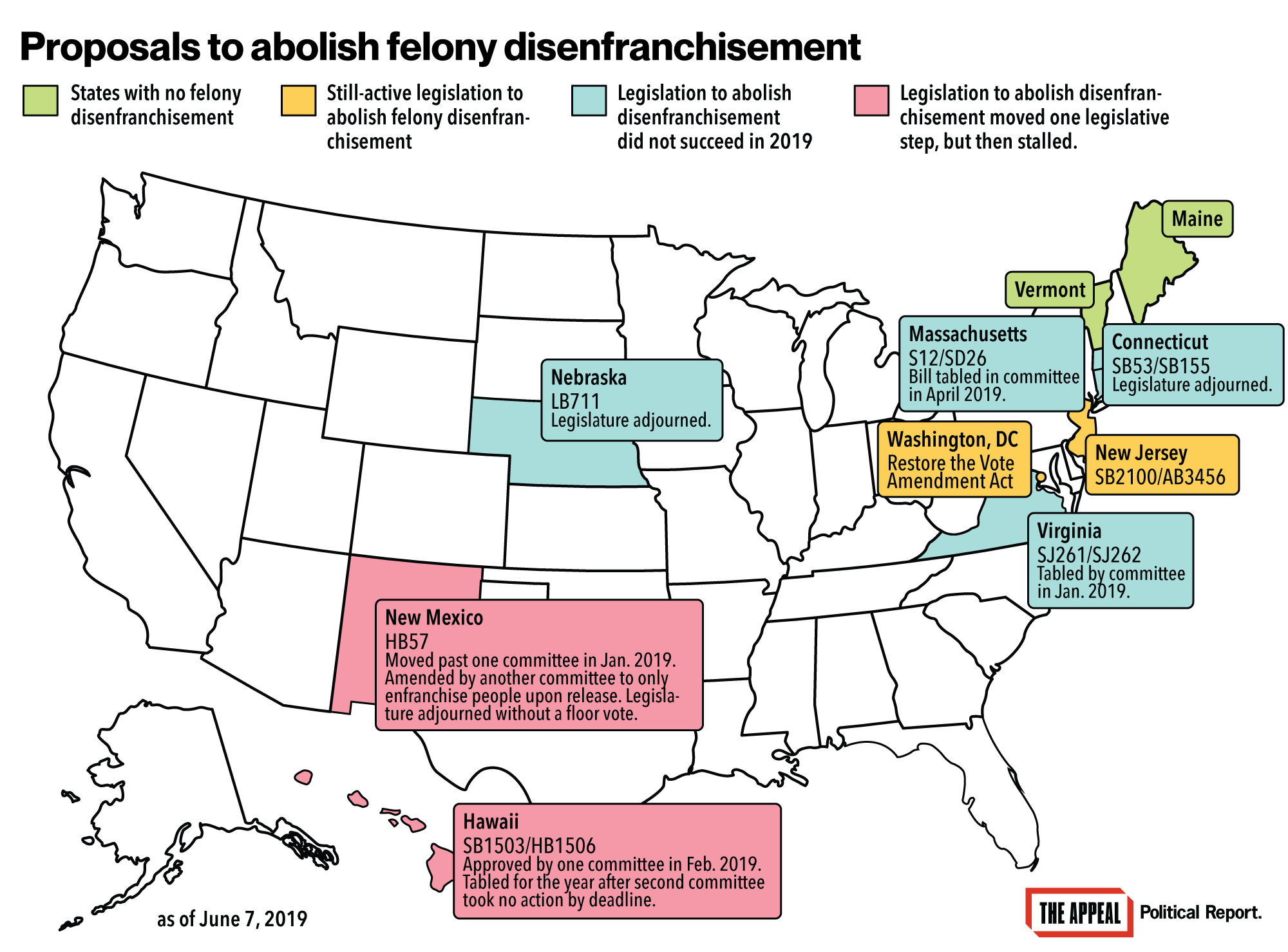Political Report
Criminal Justice Reform in the States, June 13, 2019 Edition
Legislative Roundup: Arizona and Minnesota legislature adjourn with little to show on reform, New York lifts ban on gravity knives, and more Many of the laws that govern the American criminal justice system are set at the state level. Explore the latest developments on criminal justice reform in state legislatures around the country with the […]
Legislative Roundup: Arizona and Minnesota legislature adjourn with little to show on reform, New York lifts ban on gravity knives, and more
Many of the laws that govern the American criminal justice system are set at the state level. Explore the latest developments on criminal justice reform in state legislatures around the country with the Political Report’s interactive tool.
Arizona
Despite having bipartisan support, ambitious reforms failed this year because of influential GOP power-holders and state prosecutors. That pattern was repeated in June, this time over a watered-down bill that the legislature adopted with near unanimity. Republican Governor Doug Ducey vetoed legislation that would have narrowed the circumstances in which prosecutors can treat defendants as repeat offenders. That status triggers stacked charges and harsh sentences. The legislature has already adjourned so it cannot override Ducey’s veto.
85 of the state’s 90 lawmakers backed the bill, but Arizona prosecutors lobbied against it. Pima County Attorney Barbara LaWall and Maricopa County Attorney Bill Montgomery (a perennial obstacle to criminal justice reform) wrote to Ducey that it would create a “strong incentive for repeat offenders to commit as many offenses as they can before being caught.” Republican Senator J.D. Mesnard, who sponsored the bill, rebutted that argument in the Arizona Capitol-Times. “A person who commits Crime A 10 times will get Sentence B 10 times,” he said. Mesnard voiced concern that “if we can’t get something this narrow passed, it will be a bleak three years.” Ducey’s term ends in 2022.
Lawmakers who have pushed for reform also denounced prosecutors’ behavior as duplicitous. They say they considerably watered down the bill in response to prosecutors’ demands, but that LaWall and Montgomery nevertheless lobbied against it. “The problem when someone doesn’t keep their word is that you can’t trust them anymore,” Republican Representative Ben Toma told the Capitol-Times. “I don’t know where we go from here if someone has no honor.” Mesnard asked what criminal justice reform can look like.
Arizona did adopt one law reforming the legal system this year: Senate Bill 1310 amends the requirement that people serve 85 percent of their sentences to 70 percent, but only if their sole offense is drug possession and if they complete a treatment or self-improvement program. This bill is also a considerably narrowed version of legislation that activists championed early this year. It applies retroactively, however, so it should enable thousands to be released earlier than planned.
Minnesota
The legislature adjourned in May without adopting reform legislation. A proposal to stop suspending driver’s licenses over an inability to pay court fines and fees did not make it past either chamber (despite bipartisan success elsewhere), nor did a proposal to consider indigency before imposing fines and fees. Other bills that drew attention but passed neither chamber included a five-year cap on probation terms and a proposal to enable people on parole to vote, as is the law in 18 other states. Earlier this year, the GOP-run Senate also killed a bill to legalize marijuana.
New York
The state’s ban on gravity knives is no more: Governor Andrew Cuomo signed into law a bill sponsored by Assemblymember Dan Quart that decriminalized their possession. The Appeal reported on this legislation in March: The ban “has swept up tens of thousands of New York City residents, overwhelmingly people of color, for owning what critics argue are common work tools,” Jon Campbell wrote. Cuomo had vetoed similar legislation twice before.
Also in New York, the Domestic Violence Survivors Justice Act is a new law that allows sentencing judges to consider whether a crime was connected to abuse that a defendant suffered. “One of the most striking things about the law is that it chips away at the entrenched notion that some people in society do harm and others suffer harm,” Sarah Lustbader wrote in The Daily Appeal.
Washington D.C.
The two whitest states (Maine and Vermont) are currently the only jurisdictions with no felony disenfranchisement, a practice with racist roots. That perverse situation could change this year if Washington, D.C., abolishes disenfranchisement. Kira Lerner reports in The Appeal on a new bill that would enable people to vote from prison. Every member of the City Council signed on as a co-sponsor. People who are convicted of a felony in D.C. are detained in federal prisons. If this bill becomes law, they would vote in D.C. with absentee ballots. (D.C. already authorizes people to vote while on probation and on parole.) This proposal furthers nationwide organizing to abolish disenfranchisement. 
